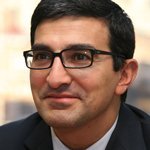Local with a global flavour – Eversheds Nicea
In the current climate, it can be tough for smaller Spanish firms to secure international work if they don’t want to merge and lose their independence locally.
One solution is to be part of an international network, as was the case with Madrid boutique Nicea Abogados and its exclusive alliance with Eversheds. “This has helped provide clients with wider legal services and facilitated growth within the firm,” says Kiko Carrión, a Partner at Eversheds Nicea.
“The members of Nicea Abogados are proud to share their original principles with the vision and values of Eversheds International,” says Carrión. The option of keeping their local structure while being a member of Eversheds International allows the firm to adapt a complete offering of full services to the necessities of the domestic and international client.
Nicea Abogados was formed in early 2010 by a group of partners from international firms DLA Piper, Baker & McKenzie and Eversheds. After Eversheds opted to end its former Spanish alliance in early 2011, following strategic differences, Nicea was selected as the replacement, rebranding as Eversheds Nicea.
When Nicea launched it had five partners, which has grown to 35 lawyers (including 11 partners) as of August 2012. Likewise, the initial launch team was made up of tax, employment, litigation, corporate and real estate and banking lawyers. The firm now has a full service structure, including, among others, IP, competition, commercial, media & entertainment and public law.
Carrión adds that international instructions have mirrored the current economy closely, particularly those coming out of distressed businesses. He is also looking at opportunities outside of Europe, hoping to benefit from Eversheds’ expansion in the Middle East and Asia.
The UK has remained the major engine over the last year, but Madrid has also worked with those in Germany, Italy, the Netherlands and France. “This ability to has made us stronger in the local market,” says Carrión, “and provided us with a much more international practice than had we remained independent”.











